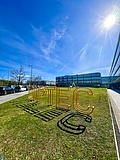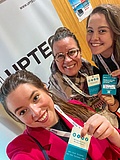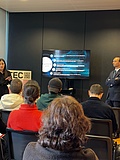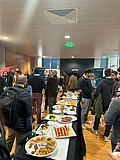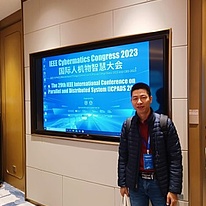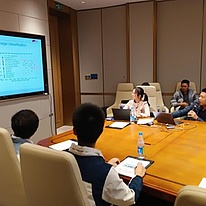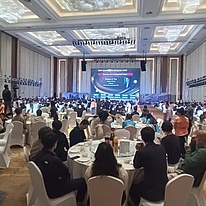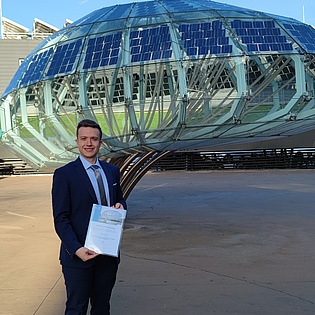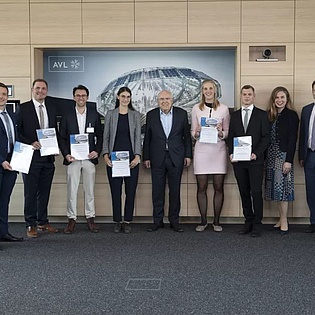Hannah and Sebastian Present a new Research in Battery-Free Systems at IEEE MASS 2024

A few weeks ago, Hannah Brunner and Sebastian Scholl traveled to Seoul, South Korea, to attend the IEEE International Conference on Mobile Ad-hoc and Smart Systems (MASS 2024) and presented their paper "Modelling and Comparing Converter Architectures and Energy Harvesting ICs for Battery-Free Systems."
Their work extends the open-source Simba simulator with models of five off-the-shelf energy harvesting ICs, enabling practitioners and researchers to explore design trade-offs and optimize performance in battery-free energy harvesting systems.
We look forward to the future research insights inspired by their work and see where further advances in the modeling and optimization of battery-free systems will lead.
October 2024
Thomas Faschang Presents Latest Research on Automotive Cybersecurity at ScapyCon 2024
We are happy to announce that Thomas Faschang, a PhD student of the Industrial Informatics Team at the Institute of Technical Informatics at TU Graz, recently delivered an insightful talk at the first ScapyCon automotive conference in Regensburg on September 18th, 2024. The conference conference was organized by dissecto and CYEQT, one of the leading companies for innovation in the field of automotive cybersecurity testing.
Thomas, who specializes in automotive cybersecurity, shared his expertise on the topic “Using Scapy for Cybersecurity Verification in ISO/SAE 21434”. Part of his research at the ITI is focused on developing comprehensive testing and training solutions for automotive cybersecurity.
For his work, Thomas delved into the complexities of adhering to UNECE Regulation 155 and the ISO/SAE 21434 standard as well as the new Cyber Resilience Act, which are essential for automotive OEMs and Tier 1 suppliers and contributed to advancements in the field of automotive cybersecurity.
October 2024
ITI joins GEED 2024!
Our Institute of Technical Informatics had the pleasure to participate at this year’s “Graz Electrical Engineering Days” (GEED)! It is an insightful experience where graduation classes from many different high schools get a glimpse into the teaching and research activities at the Faculty of Electrical Engineering and Information Technology.
Over the course of two days, we were able to showcase our cutting-edge research, offering students a hands-on look into the wonders of the embedded world.
The students had the opportunity to explore and interact with several exciting experiments, including next-generation battery management systems, real-time image generator, UWB localization technology, and RC car control.
We are excited to have shared our research with such talented students and look forward to welcoming many of them to our university in the coming years!
September 2024
Successful Conclusion of the TRISTAN Conference on RISC-V

We are excited to announce the successful conclusion of the TRISTAN public conference, hosted at our campus at Graz University of Technology!
The event was organized by our Institute of Technical Informatics, in collaboration with NXP Semiconductors Austria GmbH, as part of an ongoing EU project partnership focused on cutting-edge advancements in RISC-V technology.
The event was a fantastic opportunity for RISC-V experts to connect with students and future talents. With 120 participants on-site, including 35+ registered students, it fostered invaluable networking and knowledge sharing.
Expert speakers from leading industry players like NXP, Infineon, BOSCH, Thales, and Siemens and also top academic institutions such as Graz University of Technology, TU Wien, TU Darmstadt, ETH Zürich, University of Bologna and Tampere University presented their RISC-V related research and development activities.
This was the first RISC-V conference of this scale in Austria, and we hope this initiative will inspire more investments and attention toward RISC-V and open-source technologies, helping to build a better tomorrow.
We would like to thank all of our speakers, sponsors, and organizers from the institute who have made this event possible!
Video starten
September 2024
Markus Schuß presents E-Cube
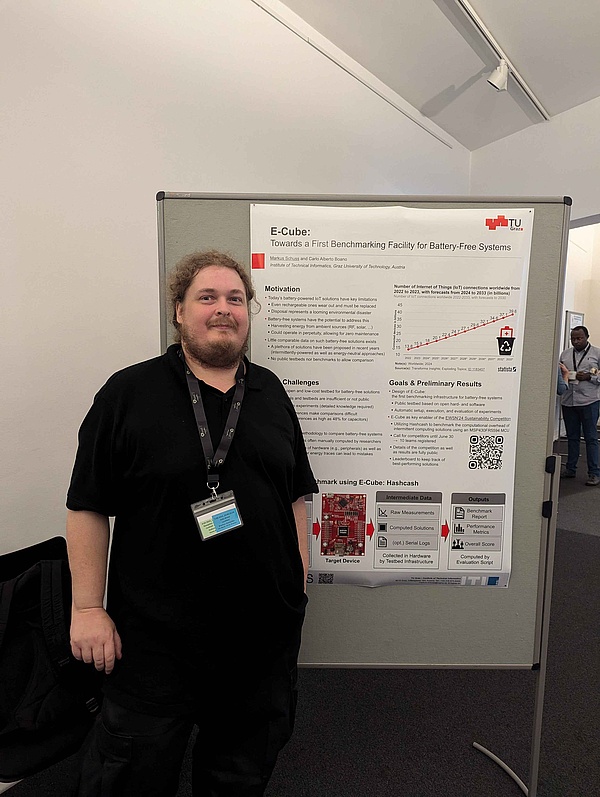
We are pleased to announce that Markus Schuß, a senior scientist from our research team, has recently presented his latest research on "E-Cube: Towards a First Benchmarking Facility for Battery-Free Systems", at this year's ACM 4th International Conference on Information Technology for Social Good (GoodIT) in Bremen, Germany!
In a world where the environmental impact of disposable IoT batteries poses a significant challenge, E-Cube offers a pioneering solution allowing to benchmark battery-free IoT systems powered by ambient energy and to quantitatively compare their performance. This allows to shed light on the performance and limitations of state-of-the-art solutions, thus pushing the boundaries of sustainable IoT technologies.
E-Cube is currently used to run the EWSN 2024 Sustainability Competition , the first event evaluating the performance of existing intermittently-powered sensing systems under the same settings.
We are excited to see the next developments of E-Cube, and what cutting-edge solutions it will inspire!
September 2024
Visiting student from France

Among many visits to our team this summer, we also had a great pleasure to welcome Rachida, a talented student from École Normale Supérieure Paris-Saclay University in France.
Rachida joined the LENS group for a four-month research internship, where she focused on advancing machine learning techniques to overcome non-line-of-sight challenges in ultra-wideband localization. During the last four months, we engaged in various research activities, sharing many valuable experiences together.
We wish Rachida all the best in her future studies and hope to see her again someday!
August 2024
Invitation for the participation at the RISC-V-based Technical Conference

Join us for an exciting RISC-V-based Technical Conference on September 11th focused on the cutting-edge advancements in RISC-V technology! This event is a unique opportunity for researchers, students, and industry professionals to dive deep into the latest trends, innovations, and applications of the open-standard RISC-V architecture. Expect insightful talks and discussions from leading experts in both academia and industry.
We especially look forward to student insights and participation, as their fresh perspectives are crucial to driving innovation. Network with peers, share ideas, and explore collaborative opportunities in this rapidly evolving field.
The event is hosted at Graz University of Technology in cooperation with NXP Semiconductors Austria.
For more information and registration click here.
Don’t miss out on this chance to be at the forefront of RISC-V research and innovation!
August 2024
Visiting PhD students from the University of Trento
This summer, our institute is pleased to host two PhD students, Vu Anh Minh Le and Enrico Soprana, from Prof. Gian Pietro Picco's group at the University of Trento. Vu and Enrico visited the LENS group in July/August 2024 to strengthen our collaboration on ultra-wideband (UWB) research. Together with our LENS researchers, they are working to enhance UWB system performance in challenging environments.
August 2024
Summer School on Machine Learning and Optimization for Dependable Systems
Institute of Technical Informatics and FH Joanneum jointly organized a Summer School at Retzhof Castle in July 2024 in the framework of the joint doctoral program DENISE: Dependable Electronic-Based Systems. More than 30 international participants attended lectures and tutorials by experts from the US, Switzerland, Germany, Italy, and Austria. The focus of the summer school was on machine learning and optimization techniques to support dependable networked embedded systems. The participants enjoyed also the opportunity to network and socialize in the beautiful environment of Retzhof Castle.
Juli 2024
Participating at the RISC-V Summit Europe
The HW/SW Codesign Group had the pleasure of participating in the “RISC-V Summit Europe” this year with a poster presentation. The RISC-V Summit is a conference that explores new commercial applications and research results, highlighting the crucial role of strong industrial and academic communities in Europe's RISC-V success.
The team from our Institute presented its ongoing research in the field of software-defined radios (SDR) in the context of near-field communication (NFC) by Christian Sommerauer and Christian Seifert, titled: "Enhancing the RISC-V Firmware Development Workflow through a Flexible Tooling Environment". This research is a joint effort under the EU Chips JU TRISTAN project, conducted in collaboration between the Graz University of Technology and NXP Semiconductors Austria GmbH Co & KG, under the guidance of Christian Steger (TUG) and Tiberio Fanti (NXP-AT).
The presentation sparked many inspiring discussions and insightful conversations, paving the way for potential future collaborations.
Juli 2024
ITI takes part at the Faculty Day
In June, our Institute had the pleasure of participating in the “8th Faculty Day of Electrical Engineering and Information Technology.” Among the many highlights, including keynotes, games, and celebrations, we were honored to receive five special recognitions for our dedicated work over the past academic year.
Pictured from left to right, "Best Artifact Award" - Hannah Brunner, Prof. Carlo Alberto Boano, and Prof. Kay Römer for IPSN'24 publication in cooperation with TU Delft, "Best Paper Award" - Prof. Carlo Alberto Boano for DCOSS-IoT'23 and EWSN'23 publications in cooperation with Toshiba Bristol, "PhD Award from the Expert's Group on Operating Systems from GI e.V." - Leandro Batista Ribeiro for his exceptional dissertation with supervisor Prof. Marcel Baunach, "AVL Hans List Scholarship Award" - Fikret Bašić for his innovative PhD thesis, "Promotion Sub Auspiciis Praesidentis Rei Publicae" - Tobias Scheipel for the most honored and prestigious promotion.
During the event, a heartfelt recognition was also bestowed upon our cherished secretary, Silvia Reiter, who, after 36.5 years of dedicated service to our Institute, has entered a well-deserved retirement.
Thank you all for your commitment, and here's to the coming academic year and the new achievements it will bring!
Juli 2024
Mobile Computing Lab Showcases Innovative Student Projects

Prof. Olga Saukh’s Mobile Computing Lab at ITI is a prime example of a course where students can truly unleash their creativity. In this class, students embark on their own programming projects, gaining foundational knowledge essential for crafting innovative smartphone applications. Students have the opportunity to delve into various techniques, ranging from signal processing from leveraging sensors to data collection and machine learning analysis.
This year’s highlights include Dong Wang's "Master Wang Game" for activity-based gaming, Stefan Moser and Bernhard Vergeiner's "MTG Card Scanner" for Magic: The Gathering, Filippo Orru's "TopOut App" for automated bouldering video recording, and Nikolaus Ostovary's "Citizen Weather Forecast" for real-time weather predictions. These projects demonstrate the cutting-edge integration of mobile technology and machine learning. You can find videos and demos about these and many more interesting projects from the course here.
Juli 2024
Celebrating Pei Tian's PhD Promotion
Congratulations to Dr. Pei Tian for successfully defending her PhD thesis.
Dr. Tian has been an invaluable member of the LENS research group, contributing as a visiting researcher from October 2021 to October 2023. She worked on groundbreaking research concerning performance optimization with LoRa networks, publishing several joint papers with our Institute.
After years of dedication and hard work, she recently defended her PhD Thesis, titled "Research on Performance Optimization of LoRa-based Multi-hop Low Power Wide Area Networks".
We are thrilled to celebrate Dr. Tian’s achievement and wish her continued success in her career. Congratulations, Dr. Pei!
Juli 2024
Successful Master's Thesis Defense
Marcel Maderecker successfully defended his Master’s Thesis!
The Thesis "Implementation of a Radar-based Person Detection System for Access Gates" was carried out in cooperation with Axess AG, an international leading manufacturer of ticketing and access management systems.
Under the supervision of Hannah Brunner and Carlo Alberto Boano, Marcel worked on improving an important building block in one of Axess' gate solutions using the exciting Pulsed Radar technology.
We congratulate Marcel and wish him success in his future career.
Juni 2024
Celebrating Embedded Systems Lab Award Winners - Summer 2024
Congratulations to the winners of the Embedded Systems Lab Award in the summer term of 2024!
The Embedded Systems Lab Award is granted for the most innovative and creative project in the "Embedded Systems Laboratory" course. The winners are selected through a voting process during the final pitch presentations, where both students and a jury—comprising course teacher Fikret Basic and tutor Josef Kroell—cast their votes. This semester, the award goes to Jakob Oberpertinger and Fabian Burgmann for their remarkable project, where they integrated elements of face recognition technology and mechatronics into a single system. Their prize includes a certificate and a special goodie bag.
The Embedded Systems Lab is a dynamic course at ITI designed to foster a spirit of innovation and hands-on learning. This year, we witnessed an impressive array of 20 projects, ranging from RC boats to home security systems.
Congratulations to all the participants for their hard work and inspiring projects. Special kudos to our award-winning team and all the best for your future!
Juni 2024
Lange Nacht der Forschung
As part of the renowned Austria-wide event "Lange Nacht der Forschung," our Institute's team engaged with hundreds of passionate thinkers, from young enthusiasts to seasoned scientists.
Fikret Basic and his colleague Florian Scherr, alongside NXP Semiconductors Austria, presented their innovative demonstrator, exploring "How function wireless and secure Battery Management Systems of the future Electric Automobiles?"
This demonstrator is the result of years of collaboration between Christian Steger's HW/SW Codesign group and NXP Semiconductors, at present part of the ongoing EU KDT OPEVA project.
Reflecting on the event, Fikret and Florian remarked, "It was truly an unforgettable experience."
Mai 2024
Best Artifact Award at IPSN’24
Hannah Brunner visited the CPS-IoT Week in Hong Kong to present her paper "Simba: A Unified Framework to Explore and Facilitate the Design of Battery-Free Systems" at the International Conference on Information Processing in Sensor Networks (IPSN).
There, she won the Best Artifact Award for the Simba framework, which is open-source on GitHub. Congratulations Hannah!
The Simba framework helps with designing battery-free systems: these are small sensing devices that operate on harvested energy (e.g., from the sun or radio-frequency signals) and have a minimal energy budget, which makes their design rather difficult. Simba supports the designers of battery-free systems in exploring different design trade-offs in a fast and easy way based on simulation.
The work was carried out in collaboration with researchers at TU Delft, where Hannah also completed a two-week research stay in June 2023.
Mai 2024
ACM International Conference on Computing Frontiers (CF'24)
Meinhard Kissich and Leo Moser presented their latest research work at the ACM International Conference on Computing Frontiers (CF'24) in Ischia, Italy. Congratulations on the excellent presentations!
Meinhard introduced FazyRV, a scalable and minimal-area RISC-V core. The work of Meinhard and Marcel Baunach is summarized in the paper: "FazyRV: Closing the Gap between 32-Bit and Bit-Serial RISC-V Cores with a Scalable Implementation".
Leo demonstrated how FPGA stitching significantly outperforms a Sea-of-Gates approach. This work is titled "Stitching FPGA Fabrics with FABulous and OpenLane 2" and was a collaboration with Meinhard, Tobias Scheipel, and Marcel Baunach.
Mai 2024
PhD Defense – Jürgen Dobaj
FazyRV RISC-V Core is Now Open Source!

We are excited to share that FazyRV, a scalable minimal-area RISC-V core, is now open source under a permissive MIT license. The work will be presented at the Computing Frontiers 2024 conference by Meinhard Kissich and Prof. Marcel Baunach. A research paper on design insights, an in-depth evaluation, and an outlook on future work will be published soon. We invite you to explore FazyRV by checking out the GitHub repository.
April 2024
Research exchange at the University of Trento
Markus Gallacher, a PhD student at our institute, recently completed a three-week ERASMUS+ staff mobility training at the Università di Trento, where he joined the Department of Information Engineering and Computer Science.
During his time there, he collaborated closely with a research group specialized in ultra-wideband (UWB), a wireless technology typically used for accurate ranging and localization applications. Their joint efforts were dedicated to enhancing UWB distance measurements, aiming to boost accuracy even in challenging environmental settings.
April 2024
ACM/SIGAPP Symposium on Applied Computing
Congratulations to Tanveer Ali-Ahmad, Drona Nagarajan, Tobias Scheipel, and Marcel Baunach on being accepted to present and publish their work at the ACM/SIGAPP Symposium on Applied Computing (SAC) 2024 in Avila, Spain. Their publications covered some crucial aspects of kernels of real-time automotive Operating Systems while keeping the strict AUTOSAR standards in mind. Both works highlight some fundamental problems prevalent in the design of RTOS kernels.
The first paper addresses the issues associated with empty activations of sequencer tasks in "Avoiding Empty Instances and Offset Drifts of Basic Sequencer Tasks in Automotive Operating System." The second work addressed a critical issue in multicore synchronization with spinlocks in "Fair and Starvation-Free Spinlock for Real-Time AUTOSAR Systems." Both works were well received, and our colleagues could gather valuable feedback for future work on designing RTOS kernels.
April 2024
Doctorate sub auspiciis praesidentis for Dr. Tobias Scheipel
Our esteemed colleague Dr. Tobias Scheipel has been awarded with the Promotio sub auspiciis Praesidentis rei publicae, a truly special honor! He received this extremely rare promotion for his outstanding achievements at school, during his university studies, and during his PhD on “Advances in Dynamic and Reconfigurable Embedded Systems Design”. Congratulations on this remarkable success!
After his PhD, Tobias continued his research on flexible, modular and runtime reconfigurable processor architectures for embedded systems as a PostDoc at our institute. The Institute of Technical Informatics is proud to have such an excellent researcher in its ranks and wishes him all the best and continued success in his career!
Statement from the Federal President
März 2024
PhD Award from the Expert’s Group on Operating Systems

We are pleased to announce that Dr. Leandro Batista Ribeiro, who completed his PhD at our institute last year, has been granted the PhD award from the Expert's Group on Operating Systems (“Fachgruppe Betriebssysteme”) of the German Gesellschaft für Informatik (GI e.V.) for his dissertation “Advances in Dynamic Software Composition of Resource-Constrained Embedded Systems”.
The award certificate states:
“The award-winning thesis impressed the reviewers with its scope, practical relevance and technical quality. The thesis deals with concepts for partial updating and formal verification of compositional software for OS-based embedded systems. The results presented are of great importance for technology and science.”
Congratulations to Leandro for this outstanding work!
März 2024
OpenInnoTrain Research Exchange at UPTEC
Romana Blažević is currently on a four-week research exchange in Porto, Portugal, as a part of OpenInnoTrain project. The project focuses on open innovation and the translation of research results between academia and industry, and aims to enhance the potential of researchers in getting their research outcomes to the market. The core of OpenInnoTrain is to foster better opportunities for the collaboration between universities and industry and the translation of research results into products and services that will benefit society.
Romana is working with UPTEC - Science and Technology Park of University of Porto, which promotes the creation and development of projects in various fields through the exchange of knowledge between the university and the market. You can find an interview with Romana at UPTEC here.
She is continuously working on her research on trustworthy AI there, seeking input from industry partners for her future research and sharing her knowledge on the integration of such systems in environments where human lives are at stake (e.g., in the automotive domain).
März 2024
Conference talk at ICPADS’23
Nam Cao recently presented his paper “Geometric Data Augmentations to Mitigate Distribution Shifts in Pollen Classification from Microscopic Images” at the ICPADS’23 conference, which was part of the 2023 IEEE Cybermatics Congress in Ocean Flower Island (Hainan, China).
Nam’s work addresses the challenges faced by machine learning models when confronted with distribution shifts in the domain of automatic pollen identification from microscopic images. By introducing two novel geometric image augmentation techniques, he is able to significantly narrow the accuracy gap between the model performance on the train and test datasets. Details can be found in the pre-print version of the paper here.
Dezember 2023
Buying the right charger and USB-C cable
Although the EU has stipulated that electronic devices like mobile phones, tablets, cameras, headphones, and portable game consoles must have a standardized USB-C connector by the end of 2024, there are considerable differences in charging times and data rates between the available USB-C versions. Futurezone, with the support of our colleague Markus Schuss, has therefore published an article on what you should consider when buying a charger and USB-C cable. Here is the full article.
Dezember 2023
Hans List Fonds Winner
We are pleased to announce that our colleague Fikret Bašić has been awarded the Hans List Fonds scholarship by AVL GmbH for the outstanding work on his dissertation on "Enabling Secure and Wireless Battery Management Systems". The work has been conducted as part of the EU KDT OPEVA project at the HW/SW-Codesign group under the guidance of Dr. Christian Steger. Congratulations to this success and all the best for your career as a PostDoc at our institute!
The Hans List Fonds scholarship was established with the goal of encouraging and supporting excellent graduates from all Styrian universities following the memories of the late AVL founder Prof. Dr. Dr. h.c. Hans List. Six scholarships are granted each year: two for master’s theses and four for dissertations, funded with 3000€ and 5000€ respectively. To apply for this scholarship, students have to write an essay explaining why their thesis is important in the areas of innovation, benefits to the environment, and usability. More information on the scholarship can be found here.
November 2023
Didaktik-Werkstatt 2023

On October 16, the closing ceremony of the Didaktik-Werkstatt – a series of didactic workshops organized by the Science Space Styria in collaboration with all Styrian universities – took place. It was a pleasure to hear that both Hannah Brunner and Fikret Bašić from our institute were among the three candidates from Graz University of Technology who received the certificate for successfully completing this year’s the didactics program. Congratulations!
In order to receive the certificate, it was necessary to successfully complete at least three different workshops and participate in an online discussion phase for three weeks concerning different didactics topics. The workshop topics are dynamic and change each year: in 2023, it was possible to expand the knowledge and skills by learning how to apply blended learning in modern classrooms, how to efficiently prepare exams, which methods are available to improve student engagement, which approaches to use for visualisation in teaching, how to train your voice, and more.
We would like to emphasize the importance of continuous training in university didactics, as tools and methods are constantly evolving and it is our responsibility to strive for the best learning outcomes for our students.
October 2023
Best Paper Award at EWSN'23
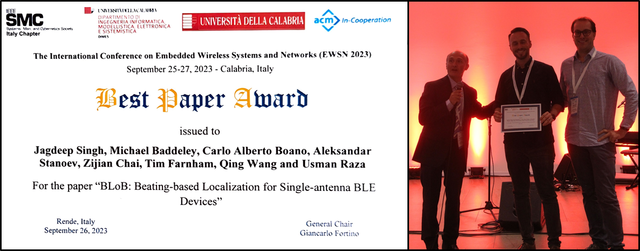
The latest research results of ITI's LENS group were in the spotlight at the 20th International Conference on Embedded Wireless Systems and Networks (EWSN'23) hosted in Rende, Italy.
Eight researchers from the Low-power Embedded Networked Systems (LENS) group have attended the conference and successfully presented several papers, posters, and live demonstrations.
In particular, BLoB and InSight were selected among the three best paper nominees, and BLoB ultimately received the best paper award!
September 2023
Highlights from the Mobile Computing Lab
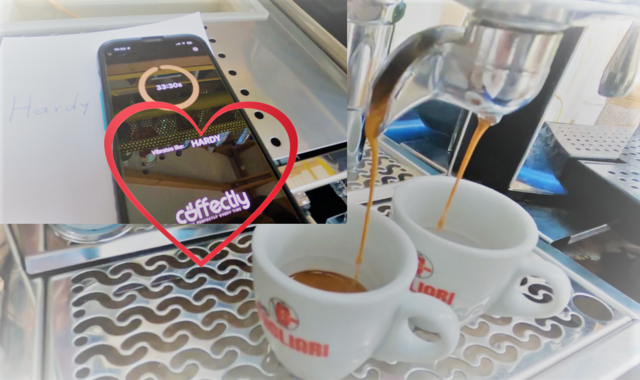
Olga Saukh‘s Mobile Computing Lab is one example of courses at ITI where students can really get creative: while working on their own programming project, students learn the basics required for developing innovative smartphone applications. This includes knowledge about signals and data that smartphones can gather, as well as the mathematical tools necessary to process the data, such as signal processing and machine learning.
A highlight of this year’s student demos is COFFECTLY by Theo Gasteiger: coffee enthusiasts will understand the importance of shot timing in the extraction of a perfect Espresso. COFFECTLY is a novel iOS application that enables automatic shot timing as well as coffee brand classification, based on acceleration measurements. You can find the videos of Theo’s and other student demos here.
Juli 2023
Mobile Computing Lab
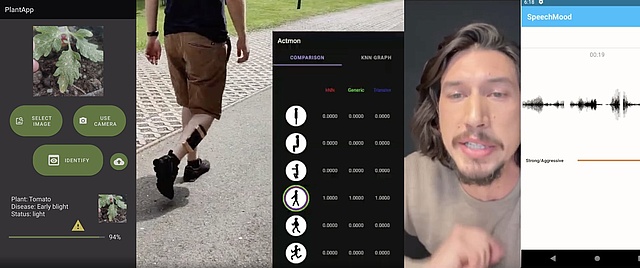
Wir zeigen eine Auswahl erfolgreich abgeschlossener Projekte aus der Lehrveranstaltung "Mobile Computing Lab" im SS'22 an der TU Graz. Die Studierenden nutzten eine breite Palette von Smartphone-Sensorsignalen, trainierten und optimierten maschinelle Lernmodelle, entwarfen eine ansprechende Benutzeroberfläche und entwickelten schließlich nützliche und leistungsstarke Android-Apps. Meistens stammt die App-Idee von einem Studenten! Herzlichen Glückwunsch zu diesem fantastischen Ergebnis!
Juli 2022
Best Presentation Award

This semester's PhD student seminar and the "First Otto Nußbaumer Workshop on Information and Communications Engineering" at Retzhof Castle (Bildungshaus Retzhof) ends with a great achievement: Leandro Ribeiro wins the best presentation award. Congratulations!
Thanks also to Prof. Gernot Kubin presenting the award.
You can download his presentation here.
April 2022
Neues Doktoratsprogramm

Für ein neues Doktoratsprogramm zu Verlässlichen Elektronik-basierten Systemen suchen wir fünf DissertantInnen. Link
November 2021
Doppelter Erfolg beim SciPix Wettbewerb

Am Institut für technische Informatik wird nicht nur auf international höchstem Niveau geforscht, sondern wartete zuletzt auch, beim TU Graz internen Fotowettbewerb „SciPix“, durch die Näherbringung der Forschung an ein breites Publikum auf. In der Kategorie „Publikums-Sieger*innen“ wurden die Fotos von Philipp Stelzer (1. Preis) und der Embedded Automotive Systems Group (2. Preis) von einem breiten Publikum zu den Plätzen 1 und 2 gestimmt. SciPix
1. Preis: Fail-Operational Umgebungswahrnehmungs-Plattform Es handelt sich hierbei um eine Plattform, die mit verschiedenen Sensoren zur Umgebungswahrnehmung ausgestattet ist. Mithilfe der Flash-LiDAR-Sensoren wurden Sicherheitskonzepte im Falle von auftretenden Störungen oder Systemausfällen geprüft und analysiert. Hardware/Software Codesign
2. Preis: Das "Metamorphic Spinning Wheel" zeichnet ein Bild Das "Spinning Wheel" basiert auf einer rotierenden Reihe von LEDs. Die EAS-Gruppe hat sowohl den Prozessor als auch das Betriebssystem entwickelt. Der Forschungsschwerpunkt liegt auf rekonfigurierbarer Hardware und modularer Software, die beide während des Betriebs aktualisiert werden können. Embedded Automotive Systems
October 2021
Zwei Auszeichnungen bei der IEEE DCOSS'21 Konferenz

Großer Erfolg des ITI bei IEEE DCOSS'21. NES-ForscherInnen wurden mit den Best Paper Award bei der Hauptkonferenz und beim UrbCom'21 Worskhop ausgezeichnet.
Link zur Konferenz
Link zum Workshop
July 2021
Best Poster Award at the Second Otto Nußbaumer Workshop
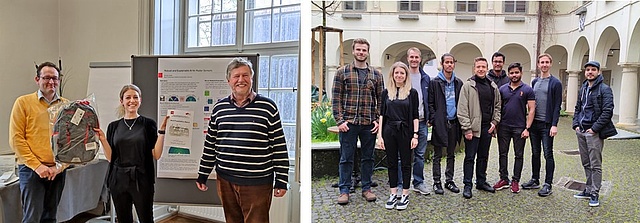
Auch in diesem Jahr nahmen zahlreiche ITI-Doktoranden am Otto-Nußbaumer-Workshop für Informations- und Kommunikationstechnologie auf Schloss Retzhof teil, um ihre Arbeiten zu präsentieren, und wir freuen uns, dass auch in diesem Jahr wieder ein Doktorand unseres Instituts ausgezeichnet wurde: Herzlichen Glückwunsch an Elisabeth Salomon zum Gewinn des Best Poster Award!
April 2023
Best Paper Award at the International Workshop on Energy Harvesting & Energy-Neutral Sensing Systems
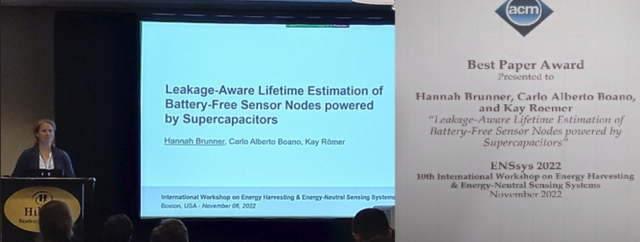
Congrats to Hannah Brunner and her colleagues for receiving the Best Paper Award at the International Workshop on Energy Harvesting & Energy-Neutral Sensing Systems (ENSsys'22) in Boston, USA. Link to the paper.
November 2022





































